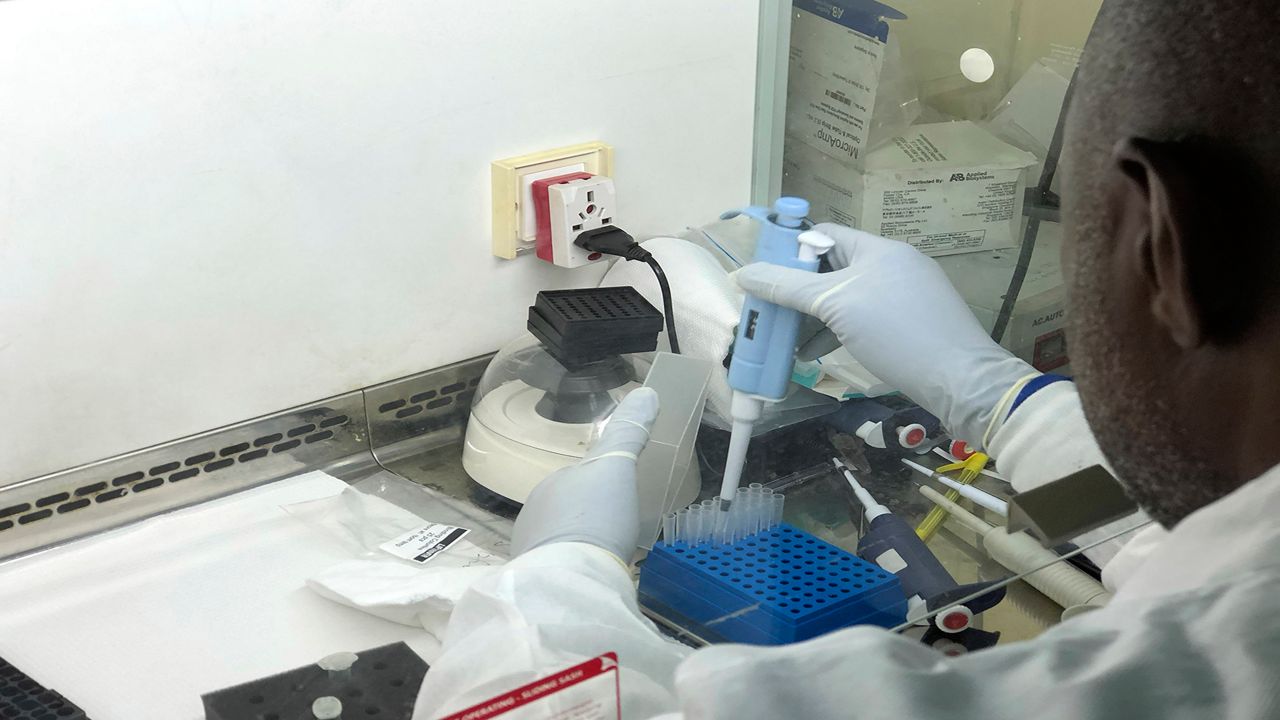OHIO — A new, likely "more infectious" variant of SARS-Cov-2, the virus that causes COVID-19, has been discovered in the state, according to researchers from Ohio State University Wexner Medical Center.
The researchers report the variant is similar to a mutation of the virus that's spreading in the U.K., but they believe it's from a strain that's already in the U.S.
At a press briefing Wednesday, study leader Dr. Dan Jones, vice chair of the division of molecular pathology, explained Ohio State ramped up its sequencing efforts upon news reports of new strains in other countries. In the case announced Wednesday, his lab discovered in an Ohio patient the same mutation in the virus’s spike protein that is present in the U.K. and South African variants, he said.
“We, like all labs across the US, once we heard about the distinct U.K. and South African strains, went looking for those viruses in our patient population, and instead what we found is a new variant that contains the mutation in the spike protein that is in common between the United Kingdom and South African variants but is on a backbone which we think is a U.S.-derived backbone, either locally or across the US.”
Jones said this discovery, along with multiple states finding the U.K. variant, bring important implications for officials weighing travel restrictions. Ohio State shared its findings yesterday with the Ohio Department of Health.
It was found in one patient so far, and it's not known how much it has spread. Researchers are also looking into whether it will effect the vaccine, though there is no evidence to date that new variants are resistant to vaccines.
“At this point, we have no data to believe that these mutations will have any impact on the effectiveness of vaccines now in use," wrote Peter Mohler, vice dean for research at the College of Medicine.
OSU Wexner Medical Center has been monitoring the evolution of the virus for months, but sequencing efforts have only become a priority recently. Jones said his lab hopes to increase sequencing in the coming weeks to look at hundreds of Central Ohio samples. In December, Wexner was examining about 10 samples per week.
More mutations are being discovered across the world. The U.K. variant has been found in 50 countries so far, including the U.S., according to the World Health Organization. The South African variant has been found in 10 countries, but not in the U.S. The Centers for Disease Control and Prevention recently reported a new strain in Nigeria that it's monitoring.
Health researchers believe the U.K. variant is about 50% more transmittable than prior strains, but no evidence suggests any of the new variants are more deadly than the previous strains. The CDC reported the variant was first discovered in September. It has reportedly contributed to upticks in hospitalizations across the world.
Ohio Department of Health Medical Director Bruce Vanderhoff said last week the state is worried about mutations, including the U.K. variant.
“It doesn't appear to be more severe. It doesn't appear to affect people who are already immune; nevertheless, the more contagious virus worries us because it could lead to more people getting sick, more people getting hospitalized, and ultimately more people dying,” Vanderhoff said.
Vanderhoff said it is important to remember it is normal for viruses to change over time from mutation.
“Most of these virus variants aren’t really very important because they don't actually change the behavior of the virus and many of them just disappear,” he said.
Ohio State Wexner Medical Center reported an outbreak last week among hospital staff and patients at its East Hospital. The cluster of more than 30 cases at the hospital was one of the first reported hospital outbreaks in the state. Hospital officials had previously said there was little evidence of transmission in hospitals due to the use of medical personal protective equipment and other protocols.
In a Jan. 6 statement, officials told Spectrum News they were monitoring the cases and sequencing to look for the new, more contagious variant of the virus first discovered in the U.K., but that had not been detected in any testing by Wexner.
Separate to the new discovery of the spike protein mutation, Wexner said Tuesday its sequencing efforts have shown the "dominant" strain the lab is finding in its recent sequencing contains three mutations. It is not yet clear if these mutations affect transmission, but Wexner doctors said it is a concern that will be studied.



